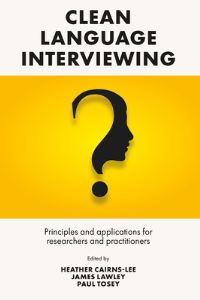M is one of my ‘conceptual’ clients. Over three sessions she talks almost exclusively in abstract terms – about trust, love, fear, guilt, depression, etc. She wouldn’t know what a metaphor was if she got one for Christmas. M’s problem pattern, which comes up several times in different forms, is “The moment I feel love and trust … I become scared I am going to lose it … and then I do.” It’s a particular problem, as you might imagine, in her intimate relationships with men.
A question such as “Scared like what?” produces the answer “Like fear.” “Fear like what?” “Like, you know, I’m scared.” And so on round the houses. Normally with clients like M I persist with clean language for half an hour and then find myself slipping into traditional therapy-speak. With M, I persist beyond my usual boredom threshold. For three sessions almost every question comes from the clean language model. M herself never falters. Never once does she answer, “I don’t know” or “I don’t understand your question”. She allows the most circumlocutory of generic musings or the most convoluted of Grovian questioning with perfect equanimity, and there is something about her serious and persistent commitment to her process that keeps us together. And suddenly – is it always suddenly that these things happen? – M has a memory of what I can only describe as the ultimate Defining Moment. It is about whether she is to live or die.
“I’m five. I want to go for a swim from the boat. My father says yes. I ask him to take me out of the sea when I’ve had enough. He says he will. I swim for five meters, then suddenly I get scared. On the boat they’re all laughing at me. I laugh as well, but I can’t swim any more, and I don’t have any energy, and I’m sinking. I wave to my father in the boat, and he waves back and laughs. I’m drowning, and he’s laughing. I love my father, and he’s laughing and letting me sink, and I’m drowning.”
I’m concerned. M is reliving the trauma. I’m just about to intervene with a question to ‘rescue’ her – to drag her back into the boat – when she says, “I can’t tell you how relieved I am to remember that and to be able to talk about it and to know I survived.” She is shaking, and crying – and laughing too, as you might expect. I am very moved. She goes on to make her own cognitive connections to her problem as an adult around love and trust.
And in the fourth session, for the first time ever in our work together, M goes into metaphor.
The lesson is: persist with clean language. Clients don’t have to go into metaphor to benefit. They don’t have to have defining moments like M’s. They don’t even have to ‘get better’. Persist with clean language, persist with cle……………….
© May 1999 Philip Harland
Coming clean by Sylvia S.
I am Philip Harland’s client M.
When Philip asked if he could write a note for the Internet about our first few sessions together, he asked me if I would like to say how they had been for me.
Well, there seemed to be a lot of ‘before’ questions: what happened before this? … what happened before that? … and I wondered what he was getting at. I knew it was a sort of psychology. He had told me it was going to be a little bit different from ordinary conversation, but to stay with the questions, and just answer what came up.
So I was answering the questions but thinking not to get lost. I didn’t want to say something glib or untruthful. And then I got scared. Why is he asking me these questions? I was scared of being upset and crying – and I don’t cry. He doesn’t know me, and he’s asking me these strange questions and I’m going to cry …
And I was surprised. I was amazed at myself for remembering – it just came from me, this memory of when I was five. And I started to cry. Strange and sometimes hard, but simple questions … I didn’t want to cry … but I was moved … I answered so simply and this huge thing just came out.
And later I made the connection to all sorts of things in my life. I can admit to myself that I’m weak sometimes, when I’ve been so strong, maybe too strong. I understand myself more. I understand more about my relationships with men – about love and trust, and running away. Scared they would let me down. It’s all connected.
I don’t know how I’ll use this yet, but a couple of weeks ago at a party with strangers, I just decided I was going to talk to anyone – about anything. It was a test for myself. I’ve always been too shy and unconfident. And everyone was so nice! They talked to me, and it went so well.
And now I have a lot of closed boxes I want to open. I don’t know what’s in the boxes. A part of me is scared to find out. I want to know what’s in the boxes before I decide whether I want to open them! At the last session it was a long time before I could open the biggest one marked ‘myself’. I wouldn’t open it because I didn’t know what was in it. And then I stopped worrying about trust, and just answered the questions, and thought about them … and I remembered something else, when I was 12 or 13, something confusing and important to me that I had never talked about before to anyone … and I found myself talking a lot about this time, for the first time ever.
And maybe there are more boxes to open, we’ll see!
Sylvia S., June 99
Good exercise by Philip Harland
A post-script to Client M’s (Sylvia) note about coming clean.
In ‘Persist with Clean Language’ I wrote about the client reconstructing a long-repressed memory of almost drowning at the age of five.
For most of her life (she is now 23), Sylvia has had a fear of water that she has not been able to understand. A fear of going out of her depth, literally and metaphorically, that has affected every part of her life.
Four weeks after the near-drowning memory, Sylvia comes into the room beaming.
“I have something to tell you,” she says.
I wonder if she has found a new boyfriend, got a new job … She looks so pleased with herself, in her sweet and shy way.
“I started swimming lessons this week!”
It seems the perfect ending to our little story. And of course for Sylvia it is only a beginning.
“You remember me telling you how I could never talk to people? And how at a party a few weeks ago I decided to test myself by talking to everyone? It was like a test I was setting for myself. Well, this week its not an examination. It’s only an exercise.”
She smiles at me. A lovely smile. And I wonder, what next?
 Philip Harland is a neurolinguistic psychotherapist with a private practice in London, England. He has written many articles on Clean Language for professional journals and the internet. In 2009 Philip published the first book related to David Grove’s last innovations, Emergent Knowledge, THE POWER OF SIX: A Six Part Guide to Self Knowledge. You can order a copy from powersofsix.com or lulu.com.
Philip Harland is a neurolinguistic psychotherapist with a private practice in London, England. He has written many articles on Clean Language for professional journals and the internet. In 2009 Philip published the first book related to David Grove’s last innovations, Emergent Knowledge, THE POWER OF SIX: A Six Part Guide to Self Knowledge. You can order a copy from powersofsix.com or lulu.com.








